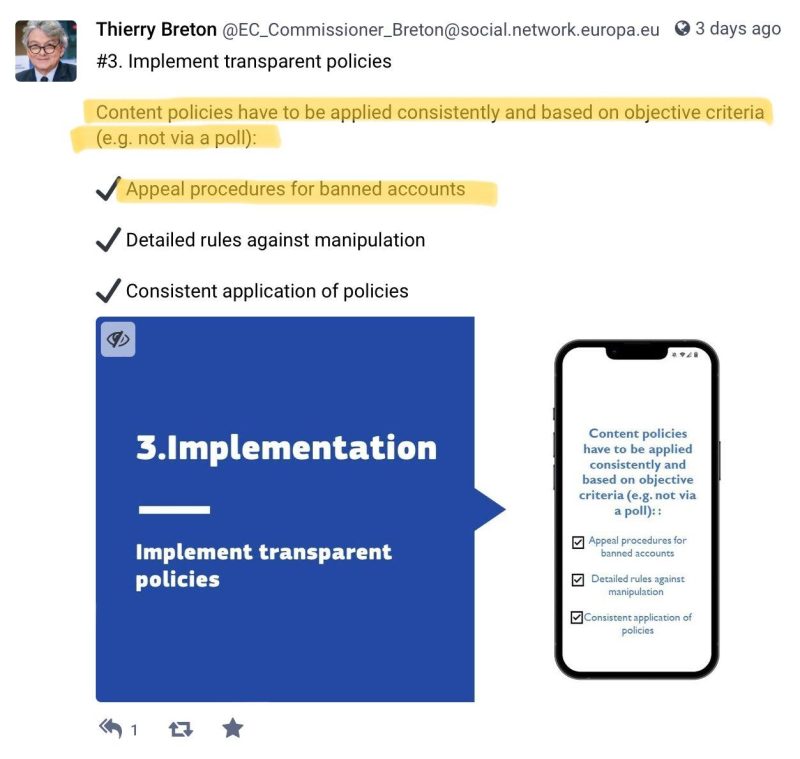Elon Musk’s announced “general amnesty” week has come and gone and there has been no sign of any amnesty at all. In particular, none of the – on Twitter’s own count – 11,230 accounts that have been suspended for violating the platform’s “COVID-19 misinformation” policy appear to have been restored.
Many have been wondering why the announced ‘amnesty’ has not occurred. But the answer is obvious. The European Union vetoed it.
“The people have spoken. Amnesty begins next week. Vox Populi, Vox Dei,” Musk famously tweeted after an online poll he had posted resulted in a landslide in favor of ‘amnesty’. But the European Commission evidently believes in a different God.
Thus, on November 30th, just two days after the amnesty was supposed to have gotten underway, the EU’s Internal Market Commissioner, Thierry Breton, posted an eerie five-second clip on Twitter, showing a grim, stone-faced Musk on a video monitor being lectured by Breton, who is himself comfortably seated in a Brussels office on the backdrop of the EU flag.
We cannot hear what Breton is telling Musk, since the clip has been posted without audio. The video conference appears to have taken place earlier on the same day.
The accompanying tweet reads: “I welcome @elonmusk‘s intent to get Twitter 2.0 ready for the #DSA Huge work ahead still – as Twitter will have to implement transparent user policies, significantly reinforce content moderation and tackle disinformation. Looking forward to seeing progress in all these areas.”
The “DSA” is the EU’s recently adopted Digital Services Act. As discussed in my earlier article here, the DSA threatens “very large” online platforms like Twitter with ruinous fines of up to 6% of global turnover if they fail to comply with what the European Commission construes as their obligations under the EU’s so-called Code of Practice on Disinformation. The main focus of the ‘Code’ for the last two-plus years has been a “Fighting COVID-19 Disinformation Monitoring Programme”, which was instituted under it.
For further details on what exactly the EU Commission is demanding of Musk and Twitter to demonstrate compliance, Breton coyly links to a Mastodon thread containing a “DSA Checklist.” Item no. 3 (see below) amounts to a not-so-subtle reprimand of Musk for having proposed a general amnesty and, in particular, for having done so on the basis of the ‘Vox Populi, Vox Dei‘ principle. It calls merely for “appeal procedures for banned accounts” – i.e. no ‘amnesty’, whether general or partial – and insists: “Content policies have to be applied consistently and based on objective criteria (e.g. not via a poll).”

Item no. 1 demands that Musk and Twitter “reinforce content moderation” – a.k.a. censorship – and somehow, in the manner of squaring the circle, “protect freedom of speech” at the same time. Note that Breton’s tweet and the introductory post to his Mastodon thread both indeed call on Musk to “significantly reinforce content moderation”, thus making clear that the Commission not only disapproves of the prospect of banned accounts being restored, but also of the relatively more laissez-faire attitude that Musk has thus far adopted toward current users.
But perhaps most tellingly, Breton’s introductory post notes his satisfaction at hearing that Musk “has read [the Digital Services Act] carefully” – highly unlikely given the length and complexity of the legislation – “and considers it as a sensible approach to implement on a worldwide basis”. The emphasis is mine.
This is to say that the EU’s censorship requirements are to be applied not only within the EU itself, but globally. As discussed in my previous article, unbeknownst to most of the rest of the world, this is in fact what is happening, including in the United States, where any such legally-required abridgment of freedom of speech is obviously incompatible not only with the spirit, but also with the letter of the First Amendment.
Breton’s complete set of demands can be read here.
Robert Kogon is a pen name for a widely-published financial journalist, translator and researcher working in Europe. Follow him at Twitter here and read his Substack here. This article was first published by the Brownstone Institute.












To join in with the discussion please make a donation to The Daily Sceptic.
Profanity and abuse will be removed and may lead to a permanent ban.
etc
This implies banks will be forced to provide a service. It is remarkable how often freedom loving individuals, want to take away the freedom of others to comply with what they want.
People will have a Right to have access to cash.
Quite apart from the tyranny, these Rights will have a cost the incidence of which will fall on a majority who are ‘tech savvy’ and who don’t need cash.
So the rest of us have to suffer to accommodate a minority.
For shame.
A.I. that beacon of customer service excellence that’s what they will offer, basically a talking jam pot
😀😀😀
There is a cost to receive banking services whic we all have to pay through unpaid interest on credit balance and bank charges. The status quo is that cash is legal tender and individuals such as I wish to exercise their continued right to use it. Those that wish to take advantage of perceived convenience of digital transactions most
of whom, smug in their tech savviness, don’t see the obvious surveillance and coercive risk. I am sufficiently tech savvy to see the necessity to choose to use cash going so far as to tell the local community pub that if they wont accept my cash I wont be buying any drinks there. Those that uncritically accept convenience will suffer far more further down the line. Shame on them
Knock yourself out. Use cash but those of us who are economics savvy know there is a cost to using cash.
Use it but don’t expect me to pay the cost.
Cash is FREEDOM cash is KING. Hope you enjoy the Gulag mate.
Something very wrong with you mate
Phoney Bliar. Nuff said.
You cannot trust anyone in Parliament, They are all Liars, Good Liars, bad Liars, One or two great Liars. But remember all are liars.
I wish that were less true. Until a few years ago the Netherlands, my adoptive country, had an apparently unshakeable tradition of very high trust in government. That trust had been genuinely earned over a century or more. It was what made the Dutch parliament believe it had the power and authority to introduce mandatory QR codes during Covid, and what made much of the unthinking public accept that decision at the time. Now, trust in politicians here is roughly where Britons’ trust in their politicians was perhaps 20 years ago: a certain cautious benefit of the doubt, perhaps, but always granted with great wariness.
That may be more realistic, but it’s very sad – most politicians here actually were and still are generally much more straightforward and trustworthy than Westminster ones, so that level of distrust is less realistic. It’s also pushing the more image-conscious and radical politicians (which group easily includes Frans Timmermans, may he never become Prime Minister) to talk in soundbites for their own faction rather than have the open and largely amicable debates they used to have when I started following Dutch politics 12 years ago.
What about non-citizens?
For them there’s the Migracard. Works like a Get Out of Jail Free card with the added benefit of getting £200 on a regular basis without passing Go
They aren’t concerned with those… as long as they keep voting the right way (by post, naturally)
I support this campaign and add: there are “less tech-savvy people” and also people who don’t want tech, but most of all, the 3.45 million people who CANNOT use smart tech. as they have electromagnetic hypersensitivity. This means being near smart devices, Wifi or phone masts makes them ill immediately. The rest of us are affected, but don’t know it because there are gradual changes to the DNA and mitochondria, leading to dementia, cancer, infertility and DNA damage in the long term. On EHS read: https://icbe-emf.org/activities/electrohypersensitivity/ and for thousands of studies showing healh harm go here: bioinitiative.org/
It is possible to use tech safely by wired connections. We don’t need smartphones to do most things. I am living proof. I agree with Alan’s article, but there is also the health angle and the Equality Act. Millions of people are already excluded from normal life and discriminated against. Gillian Jamieson
Bill of Rights requires a proper Constitution, which does not exist. A sort of digital Magna Carta, which serves not just the Knights of the Realm but also all its citizens. In other words, the voluntary overthrow of a thousand-year old type of government. This will not happen, and such as this articles only expose romantic authors’ wishful thinking. On the positive side, they offer group therapy to the commenters.
I agree – we need less laws, not more of them…
I have written a response to the consultation. It is a ‘no’ from me.
https://open.substack.com/pub/myrauk/p/digital-id-system-the-uk-governments?r=ylgqf&utm_medium=ios
Your consultation response had a lovely perspective lifting the issue above the utilitarian level
I think we’ve just had a very clear demonstration of how safe your Data will be in the Government’s hands.
They might just as well scrap the Data Protection Act since they don’t comply with it themselves; no-one gets punished and they use the law to hide their incompetence from the electorate.